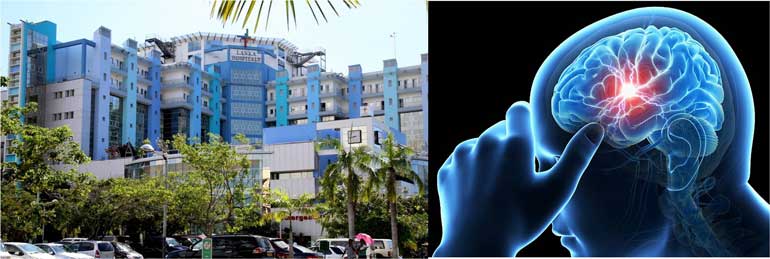Friday Feb 27, 2026
Friday Feb 27, 2026
Thursday, 3 December 2015 00:00 - - {{hitsCtrl.values.hits}}

Lanka Hospitals, the international standard tertiary care hospital which has wide range of treatments suited to treat types of strokes, ranging from surgical intervention to clot busting drugs, says early diagnosis and intervention is key to the well-being of the patient.
A stroke which could be called a ‘brain-attack’ in laymen’s language is a condition where the blood flow is reduced causing part of the brain to die. The damage to the brain increases with time and it is essential to restore blood supply to minimise further damage and put the patient on the path to recovery.
There are two main types of stroke. One type of stroke is called a ‘Haemorrhagic Stroke’ where a blood vessel is weakened and bursts releasing blood.
“If there is a rupture of the blood vessel, blood will be deprived to a section of the brain, which damages that part of the brain and it will also get collected inside the cavity of skull, generating higher pressure and causing further damage,” says Dr. Ruvini Abeygunaratne, Consultant Neurosurgeon at Lanka Hospital. “The patient can deteriorate very quickly,” she added.
A Neurosurgeon can intervene at this point in two ways, one by evacuating the blood clot and secondly if necessary but removing a part of the skull allowing the swelling brain to expand without being squeezed in a surgical procedure called ‘decompressive craniectomy’.
The second type of stoke is called an ‘Ischaemic Stroke’ where an area of the brain is damaged a by a clot (stroke of ‘embolic’ origin), in a blood vessel which blocks blood flow. If the area effected is small it may not require any procedures and can be medically managed. But if the area is large and causes significant brain swelling there is a role for surgical ‘decompressive craniectomy’. The clot may also be dissolved by certain medication and can also on occasion be evacuated by a radiological procedure.
Sometimes symptoms of a stroke may only last for less than 24 hours theses are called ‘Mini Strokes’ or ‘Transient Ischeamic Attacks’. “These are also called ‘Mini strokes’ which one would tend to recover from completely and could be taken as ‘warnings ‘of a ‘bigger attack,” Dr. Abeygunaratne says.
“One should seek help of a neurologist who would ideally start medication to thin the blood.”
A key success factor in the treatment and management of stroke is to immediate action. The patient should be bought for assessment and management to a hospital as soon as possible. Time is of essence.
If it is not a Haemorrhagic Attack or an Ischemic attack which does not cause a massive pressure in the brain neurosurgeons do not get involved.
At Lanka Hospital a patients are also treated by a ‘clot-busting’ drug or Thrombolytic agent, which was earlier only available at government hospitals. “Sometimes a patient will have the chance of a dramatic reversal of deficit after a Thrombolysis service,” says Dr. Srikanth Srinivasan, Consultant Neurologist. Not all patients are candidates to be treated by a Thrombolytic agent – but if they meet the necessary criteria the hospital will be able to commence the Thrombolysis service immediately.
“If timely treatment has not taken place, they will be left with effects such as permanent speech deficits, permanent paralysis etc. Generally once a stroke deficit takes place it will take months for those deficits or ‘effects’ to go away. Hence the treatment partly depends on how soon one could reach a hospital and what specialties there are to deal with same,” Dr. Srinivasan added.
Tests such as a CT Scan and an MRI Scan will help the neurologist to ascertain the attack. Lanka Hospitals has full-time Neurologists and full-time Neurosurgeons, who will give immediate attention to patients coming in.
Lanka Hospitals is a 270-bed multi-specialty tertiary care hospital spread over 350,000 square feet with seven acres of beautifully landscaped garden. The hospital is internationally accredited (JCIA) and holds an enviable track record, making it one of the best healthcare providers in the world today. It offers state-of-the-art features complemented by cutting-edge technology and is staffed by a well-experienced and trained team.
The hospital offers crucial emergency care, laboratory and testing services, pharmacy and other vital services round the clock for patients seeking urgent medical attention. The hospital is also equipped with a special Heart Centre, Fertility Clinic, Kidney Care Centre, Nuclear Medicine Centre, Cosmetic Clinic, Surgical Centre including neurosurgery, ENT, eye, gastrointestinal, orthopaedic, urology, reconstructive surgeries, etc.